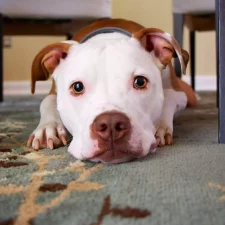March is Pet Poison Prevention Month! Poisonings are unfortunately all too common with our furry friends. In fact, incidents are on the rise. The average household contains many substances that aren’t safe for pets. It’s important to know what those hidden threats are. A local Aurora, CO vet offers some pet poison prevention tips below.
Choose Plants Wisely
Plant ingestion is a huge concern. Many popular plants, such as oleanders, philodendrons, cyclamens, and daffodils, are toxic to our furry friends. Lilies, for example, are extremely poisonous to cats. Kitties can become deathly ill just from eating a single petal, or drinking the water! Sago palms, on the other paw, are very deadly to dogs. The ASPCA has a great guideline here.
Keep Medicines Out Of Paws Reach
Many human medications are toxic to our furry friends. That includes common OTC products such as Tylenol, Advil, and Aleve, as well as prescription medicines. Dogs are particularly at risk, because they may be tempted to chew on pill bottles. Keep all medicines in cabinets your pet can’t access. If you have overnight guests, it’s also a good idea to ask them to keep their things out of the way.
Choose Pet-Friendly Antifreeze
Antifreeze is highly toxic to our four-legged buddies. However, many brands have a flavor that pets like. This has, unfortunately, led to many fatalities. Fortunately, some companies now make products that don’t taste as appealing. Choose one of these safer options.
Clean Spills
You’ll also need to protect your pets from accidental ingestion. Fido and Fluffy can ingest toxic substances simply by walking through recently-treated areas and licking their paws! Keep pets away from areas where you’re using chemicals. If you use lawn products, water the yard immediately after.
Training
Teach Fido the command to Leave It or Drop It. This can help keep him from snapping up a toxic mushroom, or gnawing on plants you’re not sure of … and could actually save his life! As to Fluffy, well, you can try teaching her Don’t Eat That, but petproofing is more effective.
Tips
If you know or suspect that your pet has ingested poison, contact us at (303) 368-4171 or the ASPCA Animal Poison Control Center at (888) 426-4435 immediately. (Charges may apply for the hotline.)
Do you have questions about your pet’s health or care? Contact us, your Aurora, CO animal clinic, anytime!







